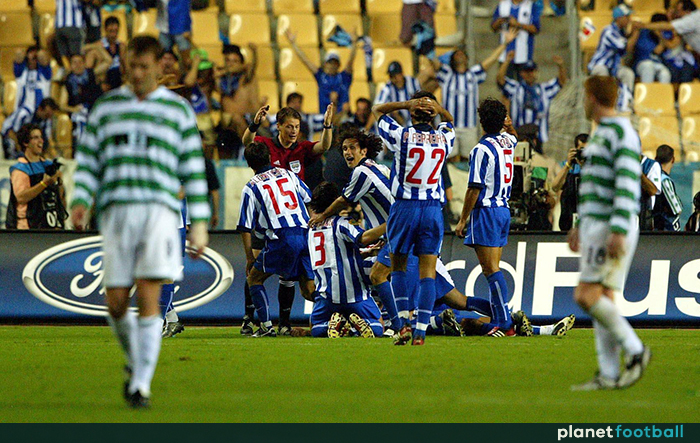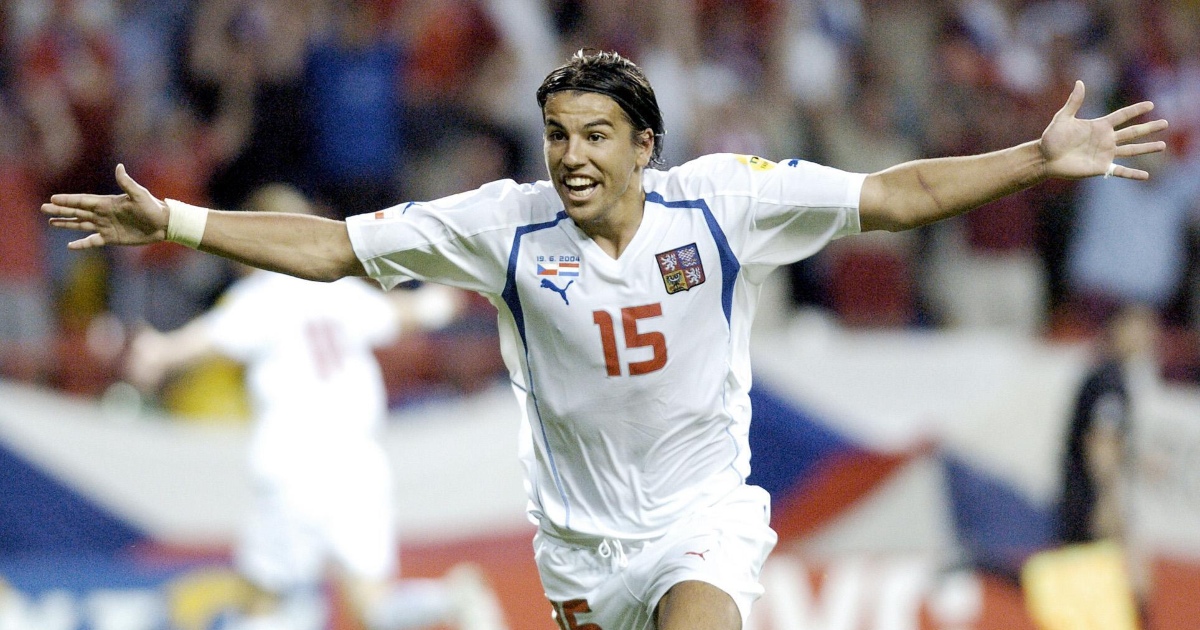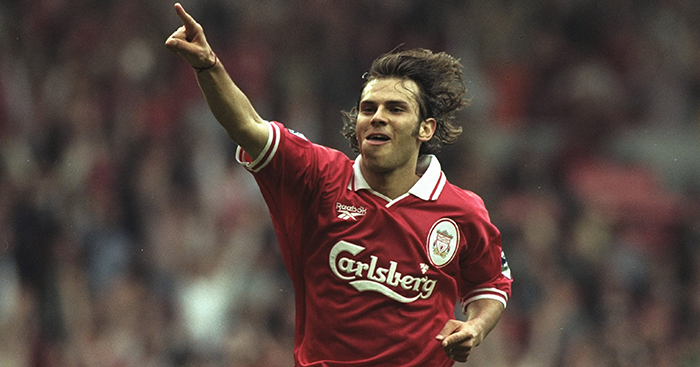Remembering the short-lived Silver Goal & the 2004 Czech side it robbed
Football has been improved by plenty of new innovations since the Laws of the Game were first published in 1863 – but the Silver Goal was definitely not one of them…
If Golden Goal was football’s glass-half-full interpretation of ‘sudden death’, then Silver Goal was something altogether less merciful – like contracting a life-threatening illness, perhaps, then realising the NHS will only cover half the treatment.
So spare a thought for the Czech Republic, who not only had to learn the short-lived rule but actually lost Euro 2004 because of it.
No, really. Had the International Football Association Board (IFAB) not decided to introduce Silver Goal, a star-studded Czech Republic side – not Greece – would have triumphed in Portugal 18 years ago. There’s hard evidence to prove it.
The 2003 UEFA Cup Final
In 2002, the idea of a Silver Goal was put forward by the IFAB, football’s rule-making body, as a new tie-break format for determining the winner of a match.
It was sold as a way to reduce the odds of a penalty shoot-out without the immediate jeopardy (and perceived unfairness) of Golden Goal, which had been introduced in 1993.
“Under the new rule,” UEFA explained, “if the match ends in a draw after 90 minutes, a first 15 minutes of extra time will be played. If one team is in the lead at the end of the 15 minutes, that team will be declared the winners of the match.”
And it was UEFA that ended up being one of Silver Goal’s biggest champions, introducing the rule for the Champions League, UEFA Cup, and eventually Euro 2004.
At first, things didn’t look too bad.
The 2003 UEFA Cup final, which saw Porto beat Celtic 3-2 after extra time, was the first significant match to use the Silver Goal rule.

Derlei’s strike in the 115th minute settled the tie, and sort of demonstrated the new rule: Celtic had five minutes to try and equalise – an opportunity they would not have been afforded under Golden Goal.
UEFA was pleased with what it saw, with Director of Communications Mike Lee commenting that Silver Goal “gave the match a much fairer way of ending and…led to some of the most dramatic moments of the night”.
But the result of that match didn’t test Silver Goal to its fullest. Since Derlei’s goal came in the second 15-minute period, the match effectively played out like classic extra time.
Euro 2004
The most high-profile occurrence of a true silver goal – one which came during the first period of extra time – wasn’t scored by Porto, but it was scored at their stadium.
The date, significantly, was July 1, 2004, when the Czech Republic faced a stubborn Greek side in the Euro 2004 semi-final.
Ninety minutes produced no goals, and when play restarted for the first period of extra time, Silver Goal kicked in: if either side gained a lead by the end of the first period, their place in the final would be secured.
So when Traianos Dellas headed in a Vasilis Tsiartas corner in minute 105+1, he didn’t so much score a silver goal as score the silveriest goal imaginable: a near-post header with a lustrous white appearance and a boiling point of 2,162 degrees.
There are a couple of reasons why that goal is slightly upsetting.
If you really concentrate on it, you might remember Milan Baros, fresh from a one-goal Premier League campaign with Liverpool, inexplicably netting five goals at Euro 2004, finishing as top scorer, and earning an unlikely Ballon d’Or nomination for his troubles.
• • • •
READ: 11 players we can’t quite believe were nominated for the Ballon d’Or
• • • •
You might even recall a side containing a cult figure from your favourite red-shirted Premier League club. Poborsky, Smicer, or Rosicky, sir?
But you may well have forgotten the exact events of Group D and the exploits of a truly remarkable Czech side.
Now I’m not Czech and have no loyalties in that regard, but I am a stickler for well-implemented tie-break rules, so this feels worth recounting.
On June 15, the Czech Republic faced Latvia, going 1-0 down in first-half stoppage time. Thanks to goals from Baros and Marek Heinz late on, they turned it around for a 2-1 win.
Four days later, Karel Brückner’s team again got themselves in early trouble, conceding twice in the first 19 minutes against the Netherlands. What followed was one of the most remarkable matches of the tournament: goals from Jan Koller, Baros and Smicer turned the match on its head, giving the Czechs a 3-2 win.
Those two comebacks guaranteed top spot for the Czech Republic, allowing them to play a second-string side against Germany (who needed a win to progress) in the final match.
• • • •
READ: How Euro 96 helped two Czech mates to Liverpool and Man Utd
• • • •
But the Czech reserves turned out to be equally resilient. Michael Ballack gave Germany the lead, but a Heinz leveller was followed by a winner from the subbed-on Baros, knocking the Germans out of the tournament for the sheer bloody fun of it.
It was like pretending to struggle at an arm wrestle, then turning over your opponent with a wink and a smile just as they think they’ve won.
Out of context, the Czechs coming from behind to win in each of their group matches is incredible.
In the context of Silver Goal, however, it’s also a little tragic.
While no magic was needed for a 3-0 hammering of Denmark in the quarters, the Czech Republic went into the Greece match as a specialist comeback side – perhaps one of the greatest ever. Given 15 minutes to overturn a deficit, these players were guaranteed to score a goal.
Only given 15 minutes they were not. The Silver Goal rule meant the Czech Republic had just a few seconds to come up with an equaliser before the would-be-half-time-in-extra-time whistle signalled the end of the match.
The whole thing seemed to come as a surprise to coach Brückner, who had only made one substitution over those 105 minutes.
Sure, Greece might have won over 120 minutes anyway, or Portugal might have beaten the Czech Republic (shorn of captain Pavel Nedved) in the final.
But take a look at the obvious incompetence surrounding Silver Goal’s introduction, and it’s hard not to feel like Nedvěd’s boys were hard done by.
About-turns at the IFAB
According to the IFAB, Silver Goal was meant to be a version of Golden Goal that prevented negative play, that gave the losing side an “opportunity to come back”, and that made things easier for match organisers.
“With the golden goal, there were issues around stadium safety and certain problems in terms of the huge additional pressure it places on the referee,” said UEFA’s Lee.
That’s all well and good, but football already had an extra time format that didn’t produce overly negative play, that placed no extra pressure on the referee, and that had a fixed conclusion. That’ll be regular ol’ extra time.
The classic format also gave the trailing side a respectable 15 extra minutes to “come back” – something Milan Baros would surely have appreciated.

According to your favourite former referee David Elleray, safety may have been the key factor in the implementation of Silver Goal.
The “major concern with the golden goal,” he said, “was the police, transport, safety,” and “people not knowing when the match would end”.
Which sort of makes sense when you consider Silver Goal side by side with Golden Goal.
But it makes absolutely zero sense when you factor classic extra time into the equation: Golden Goal can result in a final whistle at any point over the 30 minutes of extra time (bad); Silver Goal can result in a final whistle at two points (better); classic extra time only permits one possible end time (best).
The justification is weak, and the whole exercise smacks of an organisation just “trying something new” at the expense of common sense.
Unfortunately, that gaping Czech wound only gets saltier…
You see, July 1, 2004 wasn’t just the day of the most decisive silver goal in history; it was also the day the rule was officially dropped.
On February 28, 2004, less than a year after the first Silver Goal match, the IFAB voted to abolish both Silver and Golden Goal in favour of the classic extra time format, having “consulted associations the world over” and realising they preferred the regular old rules after all. Funny that.
“This new law will come into application on 1 July 2004,” said FIFA’s Urs Linsi. “As for the UEFA European Championship in Portugal…it goes without saying that as the competition will have begun before the new Law comes into being, its rules will not change.”
At that same February meeting, IFAB member and Scottish FA representative David Taylor commented that the IFAB needed to “clarify” extra time format “with a simple system”.
Taylor joked that “some games are decided by golden goals, others by silver goals….why not bronze goals while we’re about it?”
Now I don’t know how Pavel Nedved, Petr Cech, and Marek Jankulovski feel about this, but there’s something fairly absurd about football’s rule-making body creating a new law with sloppy justification, laughing about how bad it is shortly thereafter, and then inflicting it upon a major tournament anyway.
Czech Republic are winners in my eyes. The IFAB remain losers.
READ NEXT: Remembering the Pepsi World Challenge: Beckham, Rivaldo, Veron & a shambles
TRY A QUIZ: Can you name every member of England’s squad for Euro 2004?
























